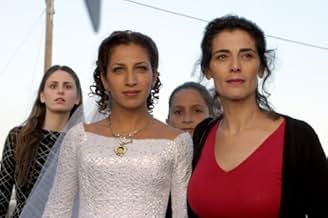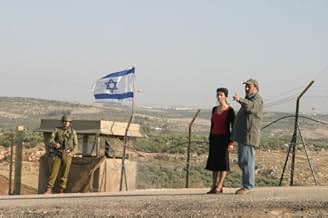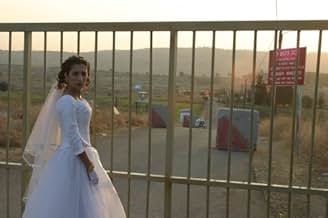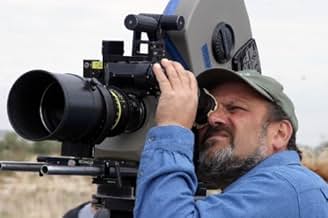NOTE IMDb
7,4/10
3,5 k
MA NOTE
Mona doit se rendre en Syrie pour finaliser les détails du mariage arrangé entre elle et son cousin, une star de la télé. Mona sait qu'une fois là-bas, elle ne pourra plus jamais revoir sa f... Tout lireMona doit se rendre en Syrie pour finaliser les détails du mariage arrangé entre elle et son cousin, une star de la télé. Mona sait qu'une fois là-bas, elle ne pourra plus jamais revoir sa famille sur le plateau du Golan.Mona doit se rendre en Syrie pour finaliser les détails du mariage arrangé entre elle et son cousin, une star de la télé. Mona sait qu'une fois là-bas, elle ne pourra plus jamais revoir sa famille sur le plateau du Golan.
- Réalisation
- Scénario
- Casting principal
- Récompenses
- 8 victoires et 15 nominations au total
Hiam Abbass
- Amal
- (as Hiyam Abbass)
Makram Khoury
- Hammed
- (as Makram J. Khoury)
Ashraf Barhom
- Marwan
- (as Ashraf Barhoum)
Evelyn Kaplun
- Evelyna
- (as Evelyne Kaplun)
Adnan Tarabshi
- Amin
- (as Adnan Trabshi)
Marlene Bajali
- The Mother
- (as Marlene Bajjali)
Uri Gavriel
- Simon
- (as Uri Gabriel)
Robert Henig
- Joseph
- (as Robert Hoenig)
Avis à la une
THE SYRIAN BRIDE would probably best be appreciated by those who understand the intricacies of border rules and inter-country regulations that dominate the plot of this well made but a bit obtuse film.
The story takes place on the wedding day of a beautiful bride, a Druze woman in Majd Alshams, a pro-Syrian village located in the conflicted Golan heights (factions pro-Syrian and pro-Israeli live uncomfortably in Druze villages). Our bride is to marry (by arrangement - she has never met him) a Syrian TV soap opera celebrity. The problem arises in that this will be the last time that she sees her family as once she crosses the border into Syria accepting Syrian citizenship, she can never return to the Golan Heights to see her family. The wedding is further complicated by the return visit of her brother who has been away for 8 years having married a Russian by whom he has a son: the brother and the son are in conflict. And to make things worse, the paperwork at the border to allow the bride to join her husband to be in the wedding is held up by political paperwork. How all of these factors impact the bride's future is played out by the families on both sides.
The script tries to make the story seem credible but to those of us who still don't understand the intricacies of the territorial parceling of that area of the world or the traditions of Arab marriage etc, this plot seems ponderous and heavy. The actors are all excellent and there is something in each character with which we can identify. A little background on customs before the film begins would have helped immensely as the movie itself is very well done. Grady Harp
The story takes place on the wedding day of a beautiful bride, a Druze woman in Majd Alshams, a pro-Syrian village located in the conflicted Golan heights (factions pro-Syrian and pro-Israeli live uncomfortably in Druze villages). Our bride is to marry (by arrangement - she has never met him) a Syrian TV soap opera celebrity. The problem arises in that this will be the last time that she sees her family as once she crosses the border into Syria accepting Syrian citizenship, she can never return to the Golan Heights to see her family. The wedding is further complicated by the return visit of her brother who has been away for 8 years having married a Russian by whom he has a son: the brother and the son are in conflict. And to make things worse, the paperwork at the border to allow the bride to join her husband to be in the wedding is held up by political paperwork. How all of these factors impact the bride's future is played out by the families on both sides.
The script tries to make the story seem credible but to those of us who still don't understand the intricacies of the territorial parceling of that area of the world or the traditions of Arab marriage etc, this plot seems ponderous and heavy. The actors are all excellent and there is something in each character with which we can identify. A little background on customs before the film begins would have helped immensely as the movie itself is very well done. Grady Harp
In Majdal Shams, the largest Druze village in Golan Heights on the Israeli-Syrian border, the Druze bride Mona (Clara Khoury) is engaged to get married with Tallel (Dirar Suleiman), a television comedian that works in the Revolution Studios in Damascus, Syria. They have never met each other because of the occupation of the area by Israel since 1967; when Mona moves to Syria, she will lose her undefined nationality and will never be allowed to return home. Mona's father Hammed (Makram J. Khoury) is a political activist pro-Syria that is on probation by the Israeli government. His older son Hatten (Eyad Sheety) married a Russian woman eight years ago and was banished from Majdal Shams by the religious leaders and his father. His brother Marwan (Ashraf Barhoum) is a wolf trader that lives in Italy. His sister Amal (Hiyan Abbass) has two teenager daughters and has the intention to join the university, but her marriage with Amin (Adnan Trabshi) is in crisis. When the family gathers for Mona's wedding, an insane bureaucracy jeopardizes the ceremony.
"The Syrian Bride" is an impressive movie, especially considering the nationality of the Israeli director Eran Riklis. I had no idea that in the twenty-first century could exist a place where people has "undefined nationality". The metaphoric situation of the Druze people, represented by the bride and her family, trapped in the non-sense bureaucracy, lack of interest from the governments in resolving the problem and having to face arrogant heartless authorities represented by the despicable chief of the Israeli police is amazing. The acting is top-notch, the plot is original and unique and I really loved this great movie. My vote is eight.
Title (Brazil): "A Noiva Síria" ("The Syrian Bride")
"The Syrian Bride" is an impressive movie, especially considering the nationality of the Israeli director Eran Riklis. I had no idea that in the twenty-first century could exist a place where people has "undefined nationality". The metaphoric situation of the Druze people, represented by the bride and her family, trapped in the non-sense bureaucracy, lack of interest from the governments in resolving the problem and having to face arrogant heartless authorities represented by the despicable chief of the Israeli police is amazing. The acting is top-notch, the plot is original and unique and I really loved this great movie. My vote is eight.
Title (Brazil): "A Noiva Síria" ("The Syrian Bride")
The story line touches many open sores afflicting the Israeli society, prejudice towards ethnic minorities, unwillingness of factions in that society to try and understand and accept one another, police bigotry and sheer racism. As an Israeli living abroad I could relate to all of the above. However, you don't have to be from that region to appreciate this moving and powerful Drama. The film basically deals with the horrific struggle of a family, from a marginalised sector of Israeli society, to get their daughter married to a man over the Syrian boarder however, by doing that they will never be able to see her again. A very very emotional and humane film.
"The Syrian Bride" uses the familiar comic genre of the colliding tensions in an extended family wedding to humanistically illuminate Middle East political, gender, generational, religious, modernization and economic tensions coming down to human relationships vs. bureaucracies.
Co-writers Suha Arraf (a Palestinian journalist) and Israeli director Eran Riklis pile almost too much on to this one Druze (Israeli Arab) family living in the occupied Golan Heights in order to make the personal political. The tensions, poignancy and symbolism of a wedding are heightened because when this bride leaves her home for her arranged marriage with a Syrian celebrity, she will not be able to return home.
Every complicated character has a complicated background, whether theirs or their parents' politics or their religiosity or their dress or their educational or romantic aspirations-- and is in a complicated relation to every other character and the authorities.
In addition to the return of prodigal sons from overseas, the larger community intrudes on the intra-family tensions, from robed tribal elders and the police who each bring warnings of proper behavior to a comical videographer. My dependency on English subtitles lessened some of the impact of hearing characters switch from Arabic to Hebrew to French to Russian to English to communicate, as part of the interactions are based on who can understand different languages and who can't. This complex in-gathering all symbolically happens the same day as a demonstration in support of the change over of power in Syria from the father the dictator to the son, while a flat tire leads to a crucial delay. The ubiquitous television, and government attention, however, is focused on the West Bank, making this border a forgotten zone as well as a no (wo)man's land.
What makes it all hang together amidst this human comedy is the central focus from the start to the finish on the almost silent bride, dressed in Western white, and her more verbal older sister, rebelliously in slacks, and both played by powerful actresses. Each has made choices in the past they regret and each chooses their future now, despite the efforts of all their male relatives, let alone global politics, to thwart them and make them helpless.
Even with the heavy-handed baggage of all the "Crash"-like coincidences, the film beautifully makes the point that politics isn't just ideology but affects how people get on with the basics of their lives.
Co-writers Suha Arraf (a Palestinian journalist) and Israeli director Eran Riklis pile almost too much on to this one Druze (Israeli Arab) family living in the occupied Golan Heights in order to make the personal political. The tensions, poignancy and symbolism of a wedding are heightened because when this bride leaves her home for her arranged marriage with a Syrian celebrity, she will not be able to return home.
Every complicated character has a complicated background, whether theirs or their parents' politics or their religiosity or their dress or their educational or romantic aspirations-- and is in a complicated relation to every other character and the authorities.
In addition to the return of prodigal sons from overseas, the larger community intrudes on the intra-family tensions, from robed tribal elders and the police who each bring warnings of proper behavior to a comical videographer. My dependency on English subtitles lessened some of the impact of hearing characters switch from Arabic to Hebrew to French to Russian to English to communicate, as part of the interactions are based on who can understand different languages and who can't. This complex in-gathering all symbolically happens the same day as a demonstration in support of the change over of power in Syria from the father the dictator to the son, while a flat tire leads to a crucial delay. The ubiquitous television, and government attention, however, is focused on the West Bank, making this border a forgotten zone as well as a no (wo)man's land.
What makes it all hang together amidst this human comedy is the central focus from the start to the finish on the almost silent bride, dressed in Western white, and her more verbal older sister, rebelliously in slacks, and both played by powerful actresses. Each has made choices in the past they regret and each chooses their future now, despite the efforts of all their male relatives, let alone global politics, to thwart them and make them helpless.
Even with the heavy-handed baggage of all the "Crash"-like coincidences, the film beautifully makes the point that politics isn't just ideology but affects how people get on with the basics of their lives.
10Red-125
The Syrian Bride (2004) was co-scripted and directed by Eran Riklis. The film is set in the occupied Golan Heights. (Note: I'm not an expert on the Israeli-Syrian conflict, nor on the Druze ethnic/religious community. I'll discuss the political situation shown on screen in general terms, and leave sophisticated analysis to other reviewers.)
The Druze are a minority within a minority. Most of them consider themselves Arab, but they are not truly Muslim--they have their own religion and their own rituals. Some Druze have more or less integrated themselves into Israeli society, but the family portrayed in the movie consider themselves Syrian. They demonstrate solidarity with the Syrians whom they can see and hear across the border. However, crossing the border into Syria is difficult, and returning is impossible.
While the Israelis and the Syrians soldiers eye each other with hostility across the barbed wire, Amal, a young woman--the very beautiful Hiam Abbass--is attempting to cross from the Golan Heights into Syria to marry a man she has never met. Because of the regulations, she will never see her family again. This sad and bizarre situation is played out against a backdrop of family antagonisms, bureaucratic incompetence, and petty malevolence. Amal's father Hammed--Makram Khoury--has to walk a fine line between saying goodbye to his daughter and resisting the Israeli military attempts to silence him. Hammed's other daughter, Mona--played by Khoury's real-life daughter Clara Khoury--is trapped in a loveless marriage, and is trying to simultaneously comfort her sister and achieve her own independence.
Nothing goes right, despite the efforts of a harassed U.N. official, who has seen her share of bizarre border incidents and by now has apparently accepted as commonplace the absolute madness taking place all around her.
There were a few comic elements in the movie, but I see it as a tragic film about a tragic situation. "When kings fall out, poor people tremble." The characters in this film are trapped in a toxic situation that they didn't create and can't control. As always, the wars of bullets and of words play themselves out in the lives of people who are simply trying to lead a reasonably normal and happy life.
The Druze are a minority within a minority. Most of them consider themselves Arab, but they are not truly Muslim--they have their own religion and their own rituals. Some Druze have more or less integrated themselves into Israeli society, but the family portrayed in the movie consider themselves Syrian. They demonstrate solidarity with the Syrians whom they can see and hear across the border. However, crossing the border into Syria is difficult, and returning is impossible.
While the Israelis and the Syrians soldiers eye each other with hostility across the barbed wire, Amal, a young woman--the very beautiful Hiam Abbass--is attempting to cross from the Golan Heights into Syria to marry a man she has never met. Because of the regulations, she will never see her family again. This sad and bizarre situation is played out against a backdrop of family antagonisms, bureaucratic incompetence, and petty malevolence. Amal's father Hammed--Makram Khoury--has to walk a fine line between saying goodbye to his daughter and resisting the Israeli military attempts to silence him. Hammed's other daughter, Mona--played by Khoury's real-life daughter Clara Khoury--is trapped in a loveless marriage, and is trying to simultaneously comfort her sister and achieve her own independence.
Nothing goes right, despite the efforts of a harassed U.N. official, who has seen her share of bizarre border incidents and by now has apparently accepted as commonplace the absolute madness taking place all around her.
There were a few comic elements in the movie, but I see it as a tragic film about a tragic situation. "When kings fall out, poor people tremble." The characters in this film are trapped in a toxic situation that they didn't create and can't control. As always, the wars of bullets and of words play themselves out in the lives of people who are simply trying to lead a reasonably normal and happy life.
Le saviez-vous
- AnecdotesMakram Khoury and Clara Khoury are father and daughter in the film as well as in real life.
- GaffesMona's father says he has raised her for 25 years. However, she states her birth date as November 30th 1976 and the movie is set on July 17th 2000. That would make her only 23 years old.
- ConnexionsFeatured in The Making of The Syrian Bride (2005)
- Bandes originalesBride Theme
Music Composed & Conducted by Cyril Morin
Performed by Bulgarian Symphony Orchestra-Sif 309
Meilleurs choix
Connectez-vous pour évaluer et suivre la liste de favoris afin de recevoir des recommandations personnalisées
- How long is Syrian Bride?Alimenté par Alexa
Détails
Box-office
- Montant brut aux États-Unis et au Canada
- 380 505 $US
- Week-end de sortie aux États-Unis et au Canada
- 7 235 $US
- 20 nov. 2005
- Montant brut mondial
- 1 522 967 $US
- Durée1 heure 37 minutes
- Couleur
- Mixage
- Rapport de forme
- 2.35 : 1
Contribuer à cette page
Suggérer une modification ou ajouter du contenu manquant

































